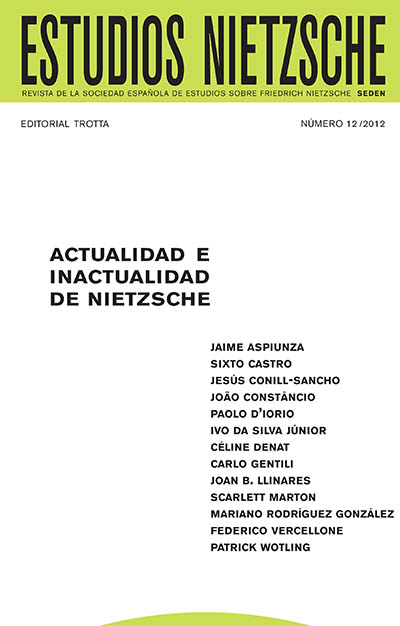Distance and combat: Nietzsche’s (Un)timeliness
DOI:
https://doi.org/10.24310/EstudiosNIETen.vi12.10560Keywords:
extemporaneous, current, Philistine culture, ideal readerAbstract
In this paper we explore the different meanings attributed to the term unzeitgemäss in Nietzsche’s texts. At first, we want to show that Nietzsche wasn’t restricted to emphasizing the outdate of his thought, but also wanted to publicize his task. Then, we show that in certain passages, to make use of that term, the philosopher is not limited to sublimating the posthumous character of his writing, but insists on his search for an
ideal reader.
Downloads
Metrics
References
Andler, C., Nietzsche, sa vie et sa pensée, Paris: NRF, 1958.
Considerations», en Nietzsche-Studien 5 (1976), 55-82.
Geisenhanslucke, A., «Der Mensch als Eintagswesen. Die Notwendigkeit einer Neubesinnung auf die Frage nach dem Mensche», en Nietzsche-Studien 28 (1999), 125-140.
Gentile, C., «Os gregos aprenderam aos poucos a organizar o caos. Os conceitos de estilo e de cultura na Segunda consideragao extemporánea de F. Nietzsche»: Cadernos Nietzsche 27 (2010), 51-71.
Hillebrand, K., Zeiten, Menschen und Volker, Berlin, 1875-1882.
Kofman, S., Explosion, vol. 2, Paris: Galilée, 1993.
Kofman, S., «Le/Les 'concepts' de culture dans les Intempestives ou la double dis- simulation», en Nietzsche aujourd'hui?, vol. 2, Paris: Uge, 1973.
Lemm, V., «Animality, Creativity and Historicity: a reading of Friedrich
Marton, Scarlett, «Afternoon Thoughts. Nietzsche and the Dogmatism of Philosophical Writing», en J. Constancio y M. J. Branco (comps.), Nietzsche on Instinct and Language, Berlin: Gruyter, 2011, pp. 167-184.
Marton, Scarlett, «Afternoon Thoughts. Nietzsche and the Dogmatism of Philosophical Writing», en J. Constancio y M. J. Branco (comps.), Nietzsche on Instinct and Language, Berlin: Gruyter, 2011, pp. 167-184.
Marton, Scarlett, «Claustros vao se fazer outra vez necesarios», en Nietzsche, seus leitores e suas leituras, Sao Paulo: Bacarolla, 2010, pp. 107-124.
Müller-Lauter, W., «El desafío de Nietzsche», en S. Marton (comp.), Nietzsche na Alemanha, Sao Paulo: Discurso editorial Unijui, 2005.
Nietzsche, F., Obras Completas, I-IV (OC ). Director ed. Diego Sánchez Meca. Madrid: Tecnos, 2011-2016
Nietzsche, F., Correspondencia I-VI. (CO). Director ed. Luis E. de Santiago Guervós. Madrid : Trotta, 2005- 2012.
Nietzsche, F., Fragmentos Póstumos I-IV (FP). Director ed. Diego Sánchez Meca. Madrid: Tecnos, 2006-2010.
Nietzsche’s Vom Nutzen und Nachteil der Historie für das Leben» en Nietzsche-Studien 28 (1999), 169-200;
Salaquarda, J., «Studien zur zweiten Unzeitgemassen Betrachtung»: Nietzsche-Studien 13 (1984), 1-45.
Sánchez Meca, D., Nietzsche. La experiencia dionisíaca del mundo, Madrid: Tecnos, 2005
Santiago Guervós, Luis E. de, Arte y poder. Aproximación a la estética de Nietzsche, Madrid: Trotta, 2004.
Siemens, H., «Agonal Configurations in the Unzeigemässe Betrachtungen. Identity, Mimesis and the Übertragung
of Cultures in Nietzsche’s early Thought», en Nietzsche-Studien 30 (2001), 80-106.
Wotling, P., Nietzsche et le problème de la civilisation, Paris: PUF, 1995
Zuchert, C. «Nature, History and the Self: Friedrich Nietzsche’s Untimely
Downloads
Published
How to Cite
Issue
Section
License
As of issue 21 (2021) this journal is published only in open access (diamond route).
From that number 21, like the previous numbers published in NIETZSCHE STUDIES, they are subject to the Creative Commons Acknowledgment-NoComercia-ShareIgual 4.0 license, the full text of which can be consulted at <http://creativecommons.org/licenses/by-nc-sa/4.0 >
It is the responsibility of the authors to obtain the necessary permissions of the images that are subject to copyright.
This work is licensed under a Creative Commons Attribution-NonCommercial-ShareAlike 4.0 International License.
Copyright generates two different rights: moral rights and patrimonial rights that EJFB recognizes and respects. Moral rights are those relating to the recognition of the authorship. They are rights of a personal nature that are perpetual, inalienable, unseizable and imprescriptible as consequence of the indivisible union of the author and his/her work.
Patrimonial rights are those that can be derived from the reproduction, distribution, adaptation or communication of the work, among others.







11.png)
